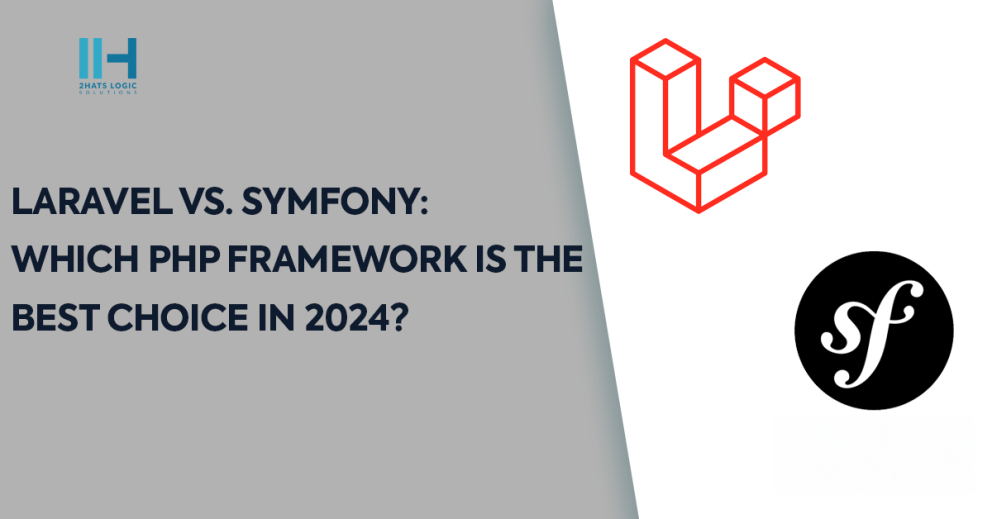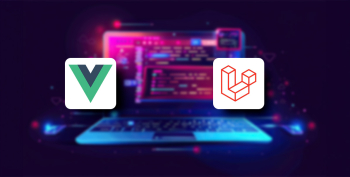Greetings! I'm Aneesh Sreedharan, CEO of 2Hats Logic Solutions. At 2Hats Logic Solutions, we are dedicated to providing technical expertise and resolving your concerns in the world of technology. Our blog page serves as a resource where we share insights and experiences, offering valuable perspectives on your queries.

Building a strong online presence is crucial for the brand to achieve great results. Thus, the decision to build the website is indeed a move in the right direction, but it is the selection of a web development service that is the next crucially important undertaking.
PHP frameworks are those that have become synonymous with web development and have proven themselves with countless benefits and functionalities. Among PHP frameworks, Laravel and Symfony are two of the most popular.
Hence, it’s time for us to further investigate the essence of these frameworks in terms of how they can resolve your business needs and requirements.
What is Laravel?
Web developers regard it as ‘the PHP framework for the web artisan,’ because of its subtle and developer-oriented syntax. It is a tool set that contains reusable components and libraries that reduce some basic tasks to routine and make web development simple. From authentication to routing, caching to database management, it has all the needed functionalities built-in as well.
Features of Laravel
- Eloquent ORM: Simplify the database interaction with active record implementation easily.
- Blade Templating: Offers an efficient and eloquent way of applying the template function to HTML.
- Artisan CLI: A very purposeful command-line interface means that redundant, manual tasks can be automatically performed.
- Laravel Mix: Provides a quick solution to complexities in asset auditing and management.
- Middleware: The proxy servers facilitate the filtering of HTTP requests and their manipulation.
- Laravel Horizon: It has a simple dashboard and gives you all the tools you need for your project queue monitoring.
Pros and cons of Laravel
| Pros | Cons |
| Fast conduct by means of the presence of built-in options and conventions. | Learning curve for beginners, especially in mastering all its features. |
| Active community engagement with proper documentation. | Performance overhead compared to lighter-weight frameworks. |
| With Composer packages, smooth integration of existing services via the platform. | Less flexibility in highly customised although advanced, situations. |
| Elegant syntax and an API that is simple to understand. |
Brands using Laravel
- Etsy: Literally, the most famous online directory, Etsy, runs on this framework, which allows buyers and sellers to have a smooth transaction and enjoy an unforgettable shopping experience from every corner of the world.
- 9GAG: Laravel is the power that connects its humongous content library, user interaction, and community features, leaving its server speed and content delivery at a higher level of efficiency.
- Toyota: A leading automotive manufacturer, uses the framework for most of its digital initiatives, such as the official websites, customer portals, and internal management systems. The benefits of flexibility and scalability the framework provides.
| Do you want a framework with plenty of customisation possibilities? Hire a Laravel developer from us to take advantage of the framework’s quick development cycle and simple syntax. Get in touch with us right now! |
What is Symfony?
Symfony is a fully-fledged framework for PHP, which makes it possible to create powerful web applications in a comparatively short time and without much hassle. It abides by rules of modularity, reusability, and extensibility, which make the developers able to develop more complex applications easily. Symfony is widely known for its secure system and compatibility with more platform conventions, thus it is the first-class choice for large organisations projects.
Features of Symfony
- Components: A set of stand-alone and reusable PHP libraries aimed at solving different jobs.
- Symfony Flex: A novel packaging management system for Symfony web applications.
- Twig Templating: The template engine is both flexible and secure to obtain dynamic webpage building.
- Dependency Injection: Fosters loose coupling for proper test-driven development.
- Console Component: It makes it possible to quickly develop command line applications.
- Symfony Profiler: An easy debugging and profiling utility for catching bottlenecks.
Pros and cons of Symfony
| Pros | Cons |
| Robust architecture that provides a scalability platform for large-scale digital metrics. | Sharp learning curve, notably for the developers who are beginners. |
| Ease of doing business, best practices, high professionalism, security, and stability. | Setting up Symfony could be a lengthy process. |
| Rich with more than 7 thousand different third-party bundles and extensions. | Requiring a better understanding of PHP and object-oriented programming principles. |
| Flexibility in selective acquisition based on the project’s requirements. |
Brands using Symfony
- Spotify: Spotify depends heavily on Symfony for their catalogue management, user profile and playlist data, and real-time streaming; thus, the framework is demonstrated to have ample capacity for these high-traffic, media-centric applications.
- BlaBlaCar: Long distance carpooling, the most recognizable platform worldwide. It provides an online service for transport, user interactions, and payments, to mention just a few. This demonstrates the trustworthiness as well as the high-performance output of Symfony on a large scale.
- Drupal: The world premiere of the fashionable content management framework – Drupal – powers millions of websites in the world. The latest version is designed on the platform, which presents Symfony flexibility and adaptability in powering the many various digital realities.
Laravel vs. Symfony: Comparison
Performance Overview
Web application’s performance has a big impact on how responsive and effective it is. With its focus on best practices and modular architecture, Symfony typically performs somewhat better for large-scale projects. However, the feature-rich environment of Laravel could add a little bit additional overhead, particularly in tasks requiring a lot of resources. However, in real-world scenarios, the difference might not matter much because both frameworks have optimizations and caching methods to enhance performance.
Security
Any web application must prioritise security. Strong security features and a commitment to industry best practices are two things that Symfony is known for. Its constituent parts, including the Security component, offer extensive capabilities for sensitive data security, authorization, and authentication. With features like passwords, CSRF protection, and middleware for input validation, Laravel also places a high priority on security. Your apps will be safe since both frameworks have active security communities and receive regular security updates.
Database Migration
A crucial component of developing applications is database migration, which makes database schema management and versioning easy. The Artisan CLI-powered migration mechanism in Laravel makes it easier to create and alter database tables, indexes, and foreign keys. It offers an easy interface for specifying schema modifications in code, which facilitates efficient and clear database administration. Similar functionality is provided by Symfony, which enables developers to specify database changes via YAML configuration files or PHP annotations in its Doctrine ORM and migrations bundle. Both frameworks make it easier to migrate databases, which allows developers to continue developing their apps without any problems.
Scalability
Scalability is essential to allowing for expansion and managing higher application load. Symfony is ideally suited for growing complicated applications both horizontally and vertically because of its modular architecture and emphasis on decoupling components. Its adherence to industry best practices and standards guarantees scalability without compromising stability. Even while Laravel is naturally scalable, it could still need further optimization and caching techniques to manage heavy traffic. However, Laravel can scale easily to meet the demands of expanding applications with the right configuration and use of caching methods..
Cost
Project budgeting and planning heavily involve cost considerations. Since Laravel and Symfony are open-source frameworks, anyone can use and share them without restriction. But the total cost of a project involves more than just the framework; it also takes into account things like hosting, development time, maintenance, and third-party integrations. Large-scale applications may see decreased long-term maintenance expenses as a result of Symfony’s emphasis on stability and best practices. For smaller projects, Laravel’s quick development features could mean a shorter time to market and cheaper initial development expenditures. The particular needs and objectives of your project will ultimately determine which framework is the most cost-effective choice.
Support
A seamless development process requires trustworthy documentation and support. With a thriving developer community, copious documentation, and comprehensive guidelines, Symfony is a great tool. Its official website includes lessons, best practices, and support forums in addition to comprehensive documentation for every component and package. In addition, Laravel offers comprehensive documentation, tutorials, and a vibrant community forum where developers may ask questions and exchange tips. Furthermore, both frameworks are regularly updated with bug patches, guaranteeing your applications will always be supported and maintained.
When to choose Laravel?
Laravel has proven to outshine in the aspects of code simplicity, as well as rapid development. It’s especially convenient for startups and SMBs/SMIMs when time-to-market is a serious concern. Some famous companies, such as Etsy, 9GAG, Toyota, and others, have extensively used the framework for web application development.
When to choose Symfony?
Symfony is quite good in advanced environments for large enterprises where scalability, stability, and maintainability are involved. It is especially needed for massive ones with heavy-duty performance requirements. Despite being only one of the many choices, the framework has managed to prove itself worthy among major players such as Spotify, BlaBlaCar, and Drupal as their choice for mission-critical projects.
Which to opt for: Laravel or Symfony?
Whether Laravel or Symfony is more suitable in your case comes down to your project needs, your team’s expertise in this field, and your long-term goals. If you choose speed of development and simplicity over functionality, Laravel is likely the best choice. But on the other side, if you are looking to undertake a massive project that will scale and have enduring architecture, Symfony can be the framework of choice. Weigh your requirements well and consider the strengths and weaknesses of every framework to make the best choice. For expert opinion, contact a web developer.
FAQ
1. What are the key differences between Laravel and Symfony?
Former is the framework which is distinguished by simplicity, elegant syntax and fast development features. As a result, its convenience kicks in on small and medium scale projects. But the latter is a more scalable, stable, and architecturally complete solution focused specifically on big applications in the enterprises.
Which framework is easier to learn for beginners: Laravel or Symfony??
For a beginner, Former might be easier to learn than latter for two reasons: it uses good, intuitive syntax, and it has excellent documentation. Nevertheless, the latter's enormous collection of features applied to the overall industry standards and object-oriented design might be a surprise to the developers looking for the fundamental knowledge of PHP and an object-oriented approach.
How do I decide whether to use Laravel or Symfony for my project?
Performing a requirements assessment, looking into scalability issues and considering your development team competence would definitely be the key questions to answer in choosing between former and latter. If you just focus on quick development and simplicity, the former might just be the better alternative. However, for a bigger undertaking with the possibility of scaling platforms as well as securing architectural stability, the latter could be justified.
Are there any notable limitations or drawbacks to using Laravel or Symfony?
Both architecture possesses the same significant features which are unexceptional, and each of them also has its constraints. Excessive Rendering is one of the problems of Javascript Frameworks which might be introduced by the former's richest environment. While the latter, which has a steep learning curve and other setup requirements for new developers may pose challenges for beginners. Another thing to note is that the former may appear to be a bit limited with various integrations and advanced customizations compared to the latter.
Table of contents

Related Articles






